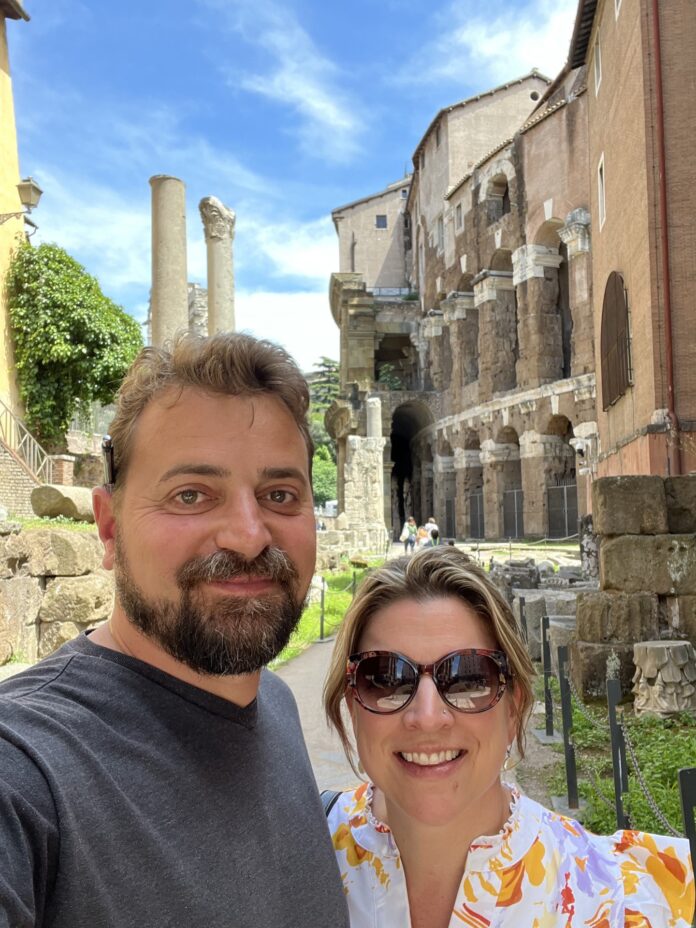
By Josh Siatkowski | Staff Writer
People say to never do business with family, but for Drs. Colleen and Davide Zori, it’s hard to tell where business ends and family begins.
Colleen and Davide Zori are professors in the Baylor Interdisciplinary Core, with offices right next to each other in Morrison Hall. The two work even closer to each other in the summers, when they travel to central Italy to work on the San Giuliano Archaeological Research Project.
The Zoris — who are history professors and archaeologists — began the San Giuliano Archeological Research Project in 2016. They have co-published numerous journal articles about the development of the site over the course of 2,000 years. In the last eight years, the project has evolved from a simple husband-and-wife research pair into an entire village made up of Baylor students as well as the children and parents of the Zoris and other colleagues.
This coupling of work and family is unlike any other. One moment, the Zoris may be unearthing a tomb of an Etruscan noble, and the next, they may be looking up, wondering where their children have wandered.
Colleen Zori said the last eight summers have led to “a blending of family and work that I’ve never been able to manage before.”
However, this blending is hard to achieve, and it takes a special situation to make it work. Davide Zori said when they found the opportunity to continue their research while remaining active parents, he wasn’t sure how it would play out.
“Admittedly, I was a little worried,” Davide Zori said. “When you mix any sides of your life together, you always worry that they won’t quite work together.”
And it wasn’t just two sides of the Zoris’ lives that were being mixed together; it was nearly all of them. The roles of researcher, teacher, parent and in-law would all overlap for the Zoris for three months of every year.
“Being able to do this project through Baylor has actually made me reconcile those two parts of my life,” Colleen Zori said.
Despite these worries, both Colleen and Davide Zori said the lifestyle came
quite naturally.
“I don’t feel that I’m putting on the professor hat or putting on the husband hat or putting on the dad hat,” Davide Zori said. “It’s all become kind of organic.”
Colleen and Davide Zori both agreed what keeps the program running smoothly is their common passion — obsession, even, according to Davide Zori — for the human past.
Thankfully, the Zoris have had ample time to develop this passion. The road to becoming an archaeologist is a long and narrow one. Academic archaeology jobs anywhere, but especially in America, are scarce and competitive. Colleen Zori said “it requires stamina” to be successful in the field.
Even before the San Giuliano Archaeological Research Project began, the Zoris were used to summer digs, as they’re a typical part of the archaeologist’s calendar, which Davide Zori called “the rhythm to the life of
the archaeologist.”
Because of this rhythm, Davide Zori said marrying another archaeologist became not just a luxury but also somewhat of a necessity.
“I think an archaeologist being with a non-archaeologist would probably be hard,” Davide Zori said.
Colleen Zori said days can become long, lonely and tiring.
“The lifestyle of going away every summer to go do fieldwork in another place is so exciting, and it’s so fun,” Colleen Zori said. “But I’ve missed weddings and graduations. There was a sacrifice that went along with it.”
Despite these sacrifices, Colleen Zori stuck through it, reminding herself that she’s had her heart set on archaeology since the age of 12.
Davide Zori was not free from these challenges either. He said he wasn’t exactly encouraged to go into archaeology.
“My advisers at the University of Florida all thought I was nuts, even the ones in the field,” Davide Zori said.
Ignoring the suggestions of his advisers, Davide Zori began a joint archaeology and history graduate program at UCLA in 2002. Colleen Zori started there the same year, and the two began dating shortly after.
The Zoris’ aligned passions have been crucial to building the life they have today. First, they have been able to make each other better academically.
“Having another smart person you could just bounce ideas off of was invaluable,” Colleen Zori said.
More than this, their studies have created a balance in their relationship that has made the blending of lifestyles in San Giuliano possible.
Although the two are united in their passion for the past, their respective research experiences aren’t always the same. As a Viking historian, Davide Zori spent summers in Iceland, while Colleen Zori spent summers in Chile researching the Inca people.
“We had these things that we were intensely sharing,” Colleen Zori said. “But at the same time, we also had some things that we had to ourselves.”
When the Zoris took this leap of faith in San Giuliano, collaborating on what had historically been a personal part of each of their lives, there were questions.
But with their shared obsession, aligned rhythms and what Colleen Zori calls “an unwavering commitment to each other,” the San Giuliano Archaeological Research Project has become not just a successful dig site but also a cherished summer tradition and liberating experience.
“I feel it can be the most authentic version of myself in [San Giuliano],” Colleen Zori said.





